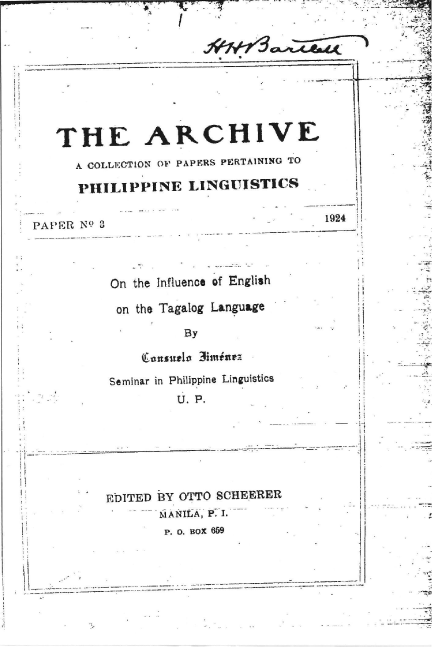On the Influence of English on the Tagalog Language
Abstract
Excerpt
To speak of the influence of one language upon another is to speak of the influence which one group of men exercises upon another such group of different speech. It need hardly be said that this influence presupposes contact of some kind, nor does it require any further explanation that, if such contact takes place under the distinct predominance of one group over the other in political, intellectual, or economic respect, the influence will be almost wholly one-sided.
These general considerations apply to the influence of English upon the Tagalog language. The ascendency of the former in the Philippines began at the time when considerable bodies of men from both sides first came into contact after Dewey’s victory in Manila Bay on May 1, 1898. This contact having now lasted in ever increasing degree, for fully a quarter of a century, we may well pause a moment by the side of the road — so to speak — which the representatives of both peoples concerned have since been traveling together, in order to review the changes wrought upon the speech of the younger wayfarer in his contact with the older traveling companion and guide.
A treatment of the question as to the degree in which the older comrade has been able to teach his language to his younger companion in substitution of the latter’s native tongue, is not here attempted. I circumscribe my task to treating the influence of English on Tagalog as it expresses itself by the presence in the latter of loan-words and colloquialisms taken from the former.
For a proper appraisal of my study I should make it clear that the collection of my material was made exclusively in Manila. While it cannot be claimed that all expressions listed by me are equally current in all parts of the Tagalog provinces, it should not be overlooked that the capital Manila acts as the intellectual distributing center in political, commercial, scholastic, and general social regard for the whole archipelago; that thruout the latter it has made Tagalog to a certain degree the leading native language; and that linguistic innovations begun at Manila are thus apt to find their way to quite remote districts.


